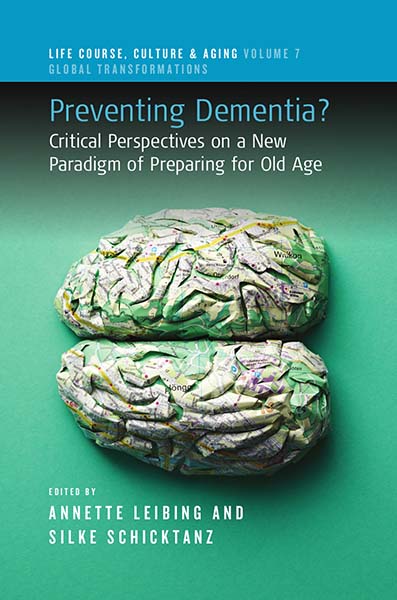“The text is extremely well referenced throughout…The compendium on the current status of dementia prevention thinking is suitable for advanced readers…Recommended.” • Choice
“Preventing Dementia? adds a much-needed perspective to the narrative coming from the plethora of books on dementia prevention that currently line the shelves of our libraries. It takes a deep dive into the history and politics that have prolonged the human suffering from a disease that still has no cure (and may never), receives inadequate support for care, and is framed by a culture that may lack the will to prevent it. Preventing Dementia? is a convincing and compelling reply to the current political debate on what constitutes legitimate infrastructure.” • Gerontologist
“…a fascinating anthology…an intriguing edited volume that will interest, first of all, social scientists studying health issues but also policymakers, health experts, social workers, nongovernmental organizations caring for people with dementia, and the media.” • Anthropology & Aging
“[This volume] collects critical and insightful positions on the new paradigm of dementia prevention from an interdisciplinary and international perspective…[It] initiates a debate about the often implicit unresolved social, ethical, and political implications and preconditions of the medical understanding and handling of cognitive disorders.” • Monash Bioethics Review
“By showing the interweaving of medical dementia prevention with epistemic, social, historical, cultural and economic factors, the individual contributions open up important impulses for dealing with the ‘new dementia’, which is still urgently needed. The volume is therefore of great interest not only for experts in medical practice, but also for medical ethics, history and sociology.” • Ethik in der Medizin
“In provoking [critical] questions, this collection provides a highly informative but also political take on the changing face of dementia prevention internationally. This will be illuminating to social science and bioethics scholars, as well as policymakers and public health practitioners engaged in dementia prevention, chronic illness, and ageing throughout the life course.” • Sociology of Health & Fitness
“Preventing Dementia offers timely critical insight into this ‘new dementia’ – a predictable and preventable midlife disease process. All academics in dementia studies will benefit from this book, and while background knowledge is required to get the most out of it, there is also considerable fodder for scholars across the medical social sciences, that is the reconceptualisation of ageing and the limits of responsibilisation.” • Dementia
“Because of its innovative approach and timeliness, the book will not only be of interest to social, ethical and public health researchers working on dementia (at all career stages) but will also be a contribution to wider debates about neoliberalism, risk, governmentality and social capital. Some of the chapters are of direct and urgent relevance to policymakers.” • Somatosphere.net
“These are excellent contributions by some of the most important critical scholars working in areas of age studies, neuroculture and health promotion. It is interdisciplinary and international in scope, and the editors have done an excellent job in producing a well-organized, well-framed and coherent volume.” • Barbara L. Marshall, Trent University
“This is an excellent edited volume on dementia prevention… the overall framing by the editors is compelling.” • Stefan Ecks, University of Edinburgh
The conceptualization of dementia has changed dramatically in recent years with the claim that, through early detection and by controlling several risk factors, a prevention of dementia is possible. Although encouraging and providing hope against this feared condition, this claim is open to scrutiny. This volume looks at how this new conceptualization ignores many of the factors which influence a dementia sufferers’ prognosis, including their history with education, food and exercise as well as their living in different epistemic cultures. The central aim is to question the concept of prevention and analyze its impact on aging people and aging societies.
Annette Leibing is a medical anthropologist and Full Professor at Université de Montréal. Her research focuses mostly on issues related to aging, by studying – as an anthropologist - Alzheimer’s and Parkinson’s in different contexts, aging and psychiatry, pharmaceuticals, elder care and, stem cells for the body in decline, among others.
Silke Schicktanz is Professor of Cultural and Ethical Studies of Biomedicine at the Institute of Medical Ethics and History of Medicine at the University Medical Center Göttingen. Her recent books include co-editing Planning Later Life: Bioethics and Public Health in Ageing Societies (Routledge, 2017) and Cross-Cultural Comparisons on Surrogacy and Egg Donation: Interdisciplinary perspectives from India, Germany and Israel (Palgrave MacMillian, 2018).
Area:
LC: RC521 .P74 2020
BISAC: MED058060 MEDICAL/Nursing/Gerontology; SOC002010 SOCIAL SCIENCE/Anthropology/Cultural & Social
available open access under a Creative Commons Attribution-NonCommercial-NoDerivatives 4.0 International License (CC BY-NC-ND 4.0) with support from the Social Sciences and Humanities Council of Canada.


